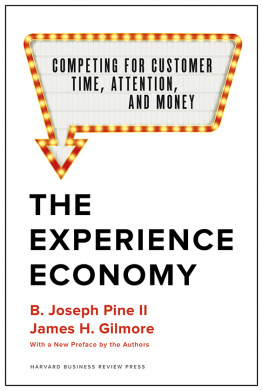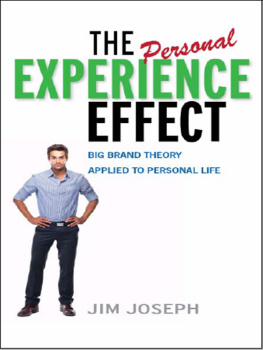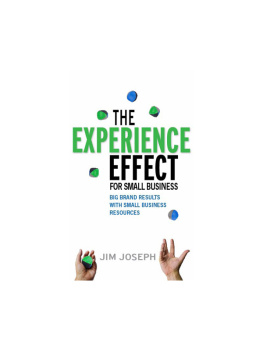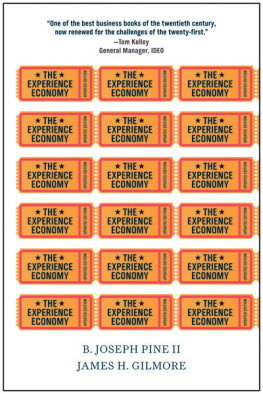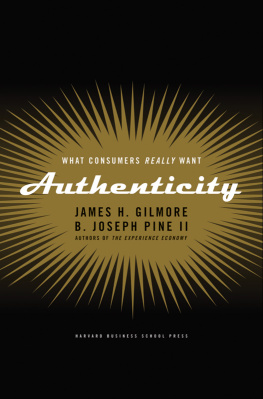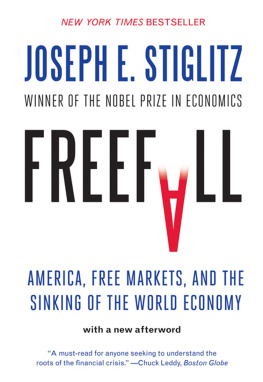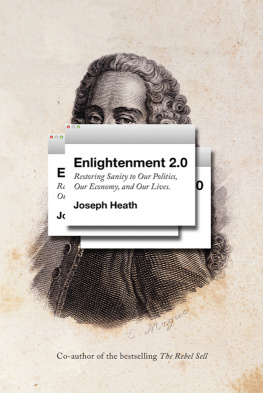B Joseph Pine - The experience economy
Here you can read online B Joseph Pine - The experience economy full text of the book (entire story) in english for free. Download pdf and epub, get meaning, cover and reviews about this ebook. year: 2011, genre: Home and family. Description of the work, (preface) as well as reviews are available. Best literature library LitArk.com created for fans of good reading and offers a wide selection of genres:
Romance novel
Science fiction
Adventure
Detective
Science
History
Home and family
Prose
Art
Politics
Computer
Non-fiction
Religion
Business
Children
Humor
Choose a favorite category and find really read worthwhile books. Enjoy immersion in the world of imagination, feel the emotions of the characters or learn something new for yourself, make an fascinating discovery.
- Book:The experience economy
- Author:
- Genre:
- Year:2011
- Rating:3 / 5
- Favourites:Add to favourites
- Your mark:
- 60
- 1
- 2
- 3
- 4
- 5
The experience economy: summary, description and annotation
We offer to read an annotation, description, summary or preface (depends on what the author of the book "The experience economy" wrote himself). If you haven't found the necessary information about the book — write in the comments, we will try to find it.
The experience economy — read online for free the complete book (whole text) full work
Below is the text of the book, divided by pages. System saving the place of the last page read, allows you to conveniently read the book "The experience economy" online for free, without having to search again every time where you left off. Put a bookmark, and you can go to the page where you finished reading at any time.
Font size:
Interval:
Bookmark:
EXPERIENCE
ECONOMY

EXPERIENCE
ECONOMY
B. Joseph Pine II
James H. Gilmore
HARVARD BUSINESS REVIEW PRESS
BOSTON, MASSACHUSETTS
HBR Press Quantity Sales Discounts
Harvard Business Review Press titles are available at significant quantity discounts when purchased in bulk for client gifts, sales promotions, and premiums. Special editions, including books with corporate logos, customized covers, and letters from the company or CEO printed in the front matter, as well as excerpts of existing books, can also be created in large quantities for special needs.
For details and discount information for both print and ebook formats, contact .
Copyright 2020 B. Joseph Pine II and James H. Gilmore
All rights reserved
No part of this publication may be reproduced, stored in or introduced into a retrieval system, or transmitted, in any form, or by any means (electronic, mechanical, photocopying, recording, or otherwise), without the prior permission of the publisher. Requests for permission should be directed to , or mailed to Permissions, Harvard Business School Publishing, 60 Harvard Way, Boston, Massachusetts 02163.
The web addresses referenced in this book were live and correct at the time of the books publication but may be subject to change.
Library of Congress Cataloging-in-Publication Data
Pine, B. Joseph, author. | Gilmore, James H., 1959- author.
The experience economy : competing for customer time, attention, and money / B. Joseph Pine II and James H. Gilmore.
Boston, Massachusetts : Harvard Business Review Press, [2019] | Includes index. |
LCCN 2019023410 | ISBN 9781633697973 (hardcover)
eISBN: 978-1-63369-798-0
LCSH: Production management. | Marketing. | Diversification in industry. | Customer services.
LCC HF5415.15 .P56 2019 | DDC 658.5/6dc23
LC record available at https://lccn.loc.gov/2019023410
To the Author and Perfecter of our faith.
Time is the currency of experiences. If you get customers to spend more time with your business then they will spend more money on your offerings. To do so, however, requires gaining customer attention amidst an increasingly wide array of options available for spending that time.
Several factors account for this competition for time. First, people can now access an untold number of digital experiences. The smartphone represents the biggest source of competition for any business in capturing customer time, attention, and moneyproviding an ever ready means to be elsewhere whenever customers feel unengaged. Fail to offer a compelling experience, and customers will instantaneously leave you to spend time in the digital realm via some app.
Second, time-based competition has blurred the boundaries of how and where people spend money across industries. Consider vacations. In its State of the American Vacation, the U.S. Travel Association reports a precipitous rise in unused vacation time among workers: some 212 million days forfeited annually as employees fear falling behind on e-mail and other workplace tasks when taking a week off. Yet if one defines taking a vacation differently, thinking of it simply as not being at work nor at home, then every hour spent at Starbucks represents a mini-vacation taken in lieu of full days spent at some faraway resort. No wonder cafes now proliferate across industries, including food (Chobani), banks (Capital One Cafs), and too many cafes for pets to mention. Even further afield, automobile manufacturers now have theme parks (Volkswagens Autostadt, Ferrari World, etc.), spirit makers turn their factories into museums (Guinness Storehouse, Heineken Experience, etc.), and consumer brands create boutique hotels, from luxury goods (Bulgari, Armani, Versace, etc.) to home furnishings (Restoration Hardware, West Elm) and even fitness centers (Equinox). Stick only with your traditional offerings and youll fail to compete for the slices of time consumers now seek from their favored brands.
Third, the options for how to spend time in physical places have exploded. New forms of tourism constantly emergemedical tourism, film tourism, glamping, mindfulness retreats, voluntourism, culinary foodcationseven space travel. Just witness the various experiences taking place today in that most basic of venues: the single room. Most notably seen in escape rooms (with some twenty-three hundred open in the United States alone), people also consume time in rage rooms, salt rooms, nap rooms, boardgame cafes, and so forth. Monthly fulfillment subscriptions of select assortments of wares from apparel to toys (each with its own box-opening experience) increasingly shift time away from retail stores to consumers own homes, as does a proliferating number of digital games with ever-increasing levels of engagement, including virtual reality. With so many options, the competition for the free time of consumers is only getting more and more fierce.
One thing is certain: customers are less willing to spend time, attention, and money on mere goods and services. Today, people more highly value experiences that engage them in personal and memorable ways.
We articulated this point of view in the original edition of The Experience Economy, never doubting the world of business would shift away from commoditized goods and services and move more aggressively toward offering myriad new experiences. The anticipated shift to this distinct economic offeringas part of what we call the Progression of Economic Valuehas now fully arrived.
Indeed, every business now competes not only with players in its own industry, nor only with those in its immediate geographic area, but with every other company in the world for the time, attention, and money of individual customers.
Obviously, time is limited. We all have only twenty-four hours a day in which to experience. So, if another company gets a customer to spend time with it, what results? Less time spent with your business.
Similarly, attention is scarce. Todays media-fragmented and technology-saturated world makes it difficult to capture customers attention with normal advertising or other marketing campaigns. But when another company creates an engaging experience that does garner attentionwhether online or offwhat else happens? Less attention directed toward your business.
And finally, money is consumable, meaning if a customer spends a dollar on another economic offering from some other company, then what cant that customer do with that dollar? Spend it on your business.
Look at a laudable exemplar of the Experience Economy, the one used to lead off : Starbucks. Howard Schultzs key insight was recognizing the value customers place on spending time in cafes, sipping their coffees while socializing, working, or just relaxing. Starbucks limits its advertising and captures customer attention instead by offering places for coffee-drinking experiences. (Ever notice that Starbucks venues are not lit on the outside? The only light comes from within, putting customers themselves on stage to gain the attention of passersby.)
And, oh, how Starbucks captures money! It takes a true commodity, unroasted coffee beans worth a mere 2 or 3 cents per cup, and turns them into experiential offerings worth $3, $4, $5and $10 or more at its even more experiential Reserve Roastery venues. Assuming that just a quarter of its customers spend an average of an hour immersed in its experience places, Starbuckss $25 billion in annual revenue equates to well over a billion customer-hours per year.
Font size:
Interval:
Bookmark:
Similar books «The experience economy»
Look at similar books to The experience economy. We have selected literature similar in name and meaning in the hope of providing readers with more options to find new, interesting, not yet read works.
Discussion, reviews of the book The experience economy and just readers' own opinions. Leave your comments, write what you think about the work, its meaning or the main characters. Specify what exactly you liked and what you didn't like, and why you think so.

